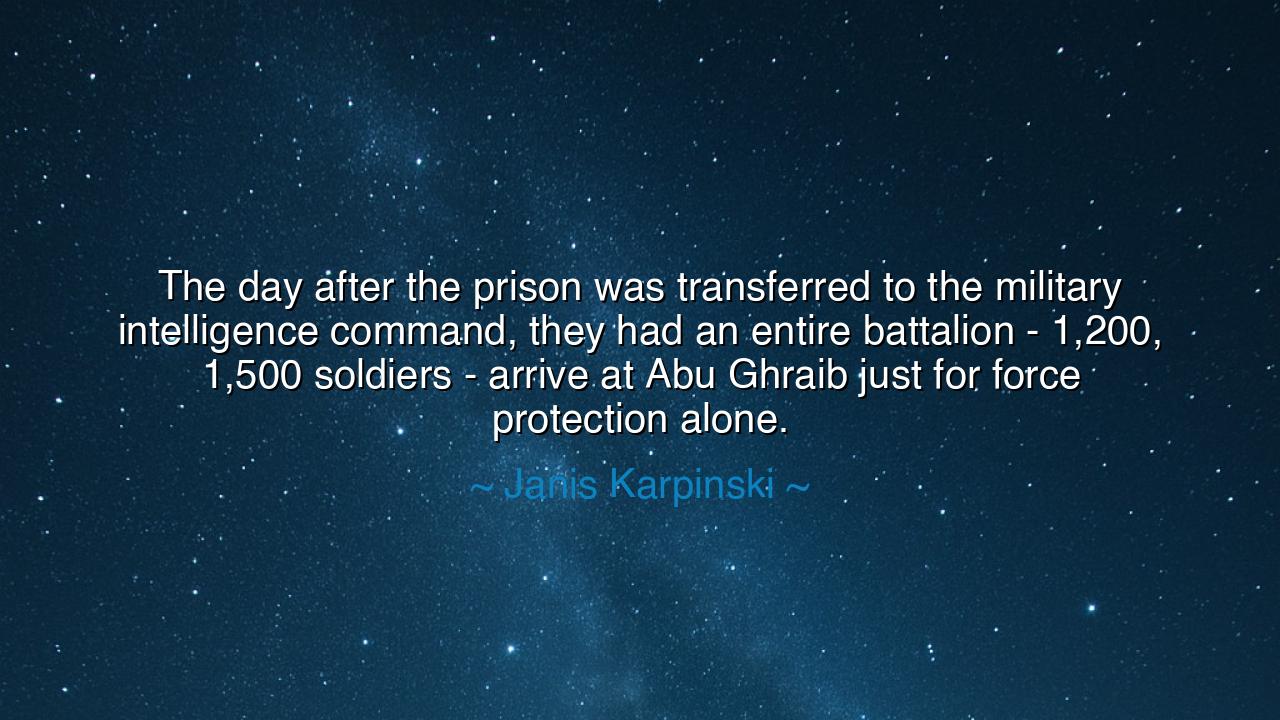
The day after the prison was transferred to the military
The day after the prison was transferred to the military intelligence command, they had an entire battalion - 1,200, 1,500 soldiers - arrive at Abu Ghraib just for force protection alone.






“The day after the prison was transferred to the military intelligence command, they had an entire battalion—1,200, 1,500 soldiers—arrive at Abu Ghraib just for force protection alone.” Thus spoke Janis Karpinski, once a general, a witness to one of the darker mirrors of human power. Her words are not the noise of politics, nor the mere recounting of an event in war—they are a lament carved in the language of consequence. They tell of a transformation, of a place once meant to hold the fallen, now consumed by the machinery of fear. They are the words of one who saw the weight of authority crush the spirit of humanity, and who dared to speak when silence was safer.
In that moment when Abu Ghraib passed into the hands of military intelligence, something greater than a command changed—the soul of the prison shifted. What was once a place of confinement became a theater of control, where shadows replaced law and secrecy stood above justice. The arrival of an entire battalion “just for force protection” was no simple act of defense; it was a sign that the power of the sword had been enthroned above the scales of mercy. For when the protectors of security must protect themselves from the truth, it is not the enemy outside the walls that should be feared, but the darkness that has entered within.
This tale, though born in the deserts of Iraq, is not foreign to the annals of humankind. The ancients too knew the danger of unchecked power. Recall the fall of Rome, when its legions, once noble, became enforcers of tyranny. The Praetorian Guard, sworn to protect the empire, turned inward, seizing emperors and selling the throne to the highest bidder. The fortress meant for safety became a prison of corruption. Thus, the echo of Karpinski’s words resounds across centuries: whenever force replaces conscience, whenever security justifies cruelty, civilization trembles on the edge of its own undoing.
Yet, one must not read her quote as despair alone. There is also warning, and within warning, there is hope. For to name the shadow is the first act of light. Janis Karpinski spoke not to condemn alone, but to awaken. She showed that the moment we surrender our humanity to the machinery of command, we become prisoners ourselves—chained not by walls, but by the blindness of obedience. Her words remind us that true leadership is not measured in soldiers or battalions, but in courage—the courage to see wrong and to stand against it, even when doing so isolates the soul.
Think also of the tale of Antigone, the daughter of Oedipus, who defied a king’s decree to bury her brother with honor. Like Karpinski, she stood between law and conscience, between the coldness of command and the warmth of human duty. Both women faced punishment not for what they destroyed, but for what they refused to betray—the eternal principle that no order is righteous when it silences the cry of the innocent. Their defiance teaches us that obedience without wisdom is the death of justice, and silence in the face of cruelty is complicity in its growth.
Thus, the quote is more than a recollection—it is a mirror for all who hold power. It calls us to remember that every institution, however noble its birth, can be corrupted by fear. The army built to defend can become the warden of its own moral decay; the government that seeks peace can sow the seeds of oppression. Only through constant vigilance of the heart can the flame of justice be kept alive. For in every age, the true battle is not against flesh and blood, but against the temptation to trade humanity for control.
And so, O listener, take from this teaching a commandment of your own: question the powers that demand your silence. When institutions grow vast, ensure their hearts remain small enough to hear the cries of the forgotten. Protect not only your nation, but your conscience; not only your people, but your principles. For no battalion, no fortress, no authority can guard against the decay of the human soul. Only truth, spoken even in the trembling voice of one witness, can redeem the fallen. And as Janis Karpinski’s words echo through time, may they remind all who hear them: the strength of a civilization lies not in the number of its soldiers, but in the courage of those who remember compassion when the world forgets it.






AAdministratorAdministrator
Welcome, honored guests. Please leave a comment, we will respond soon